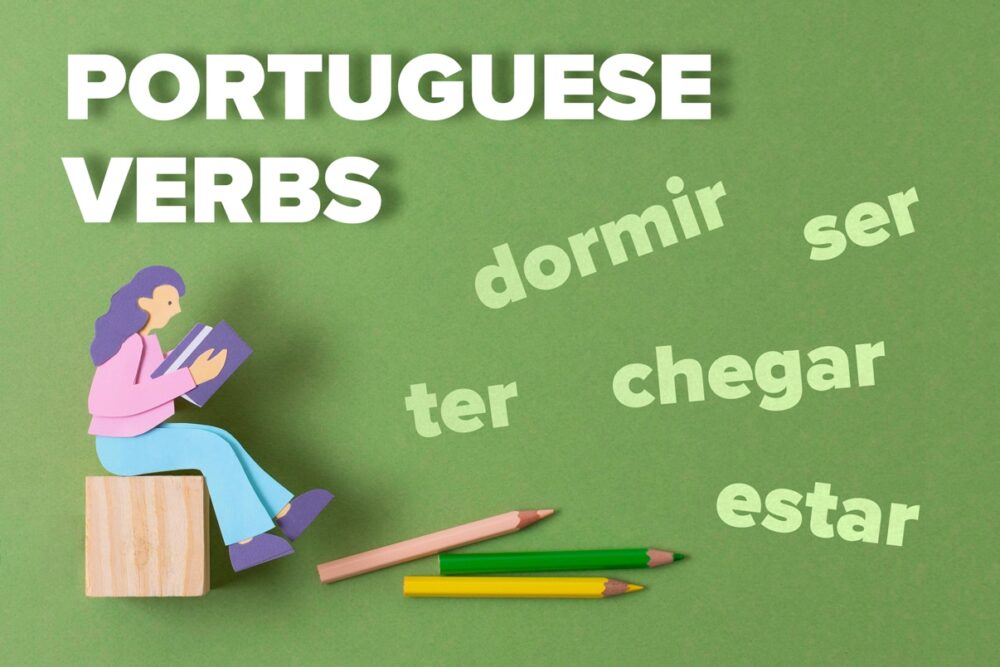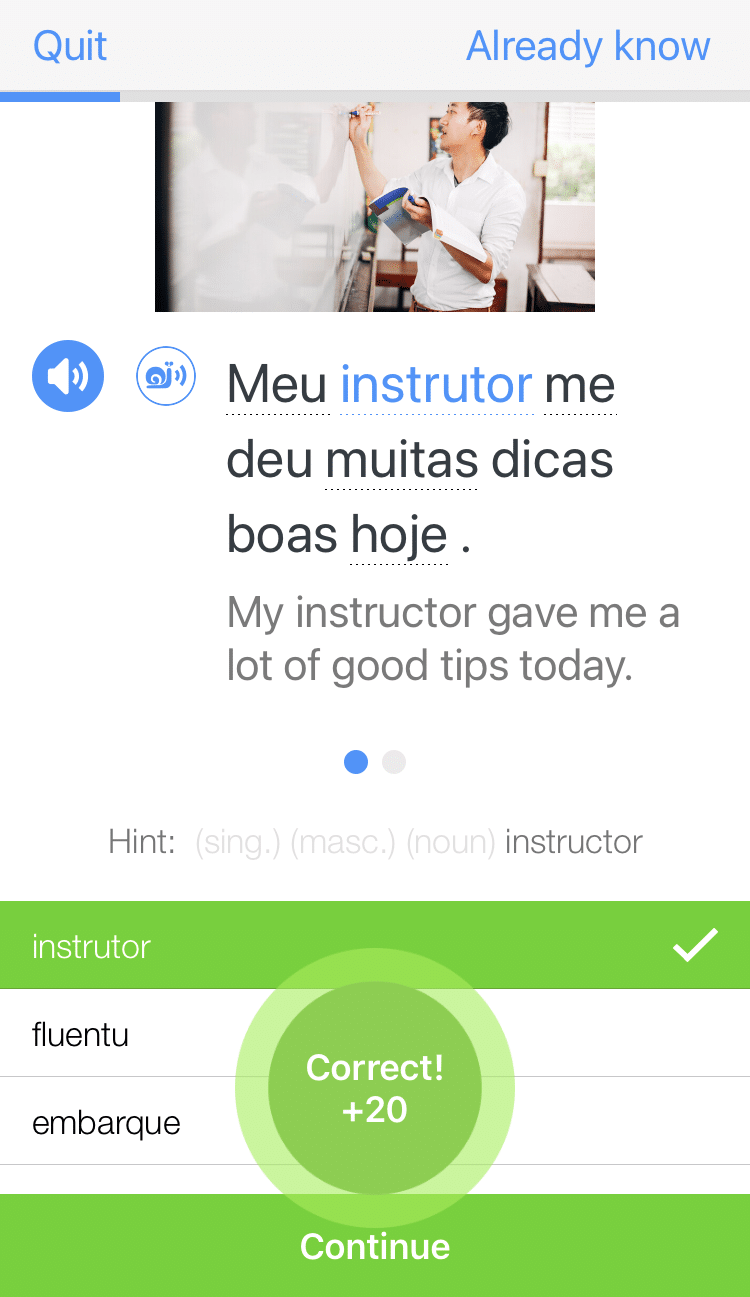Contents
- 1. Ser (To be)
- 2. Estar (To be)
- 3. Poder (To be able)
- 4. Parecer (To seem/appear)
- 5. Querer (To want)
- 6. Gostar (To like)
- 7. Esperar (To wait, to expect, to hope)
- 8. Amar (To love)
- 9. Sentir (To feel)
- 10. Saber (To know)
- 11. Conhecer (To know)
- 12. Pensar (To think, to reflect)
- 13. Achar (To think, to find out)
- 14. Aprender (To learn)
- 15. Entender (To understand)
- 16. Decidir (To decide)
- 17. Ver (To see, to watch)
- 18. Olhar (To look)
- 19. Ouvir (To hear)
- 20. Escutar (To listen)
- 21. Ir (To go)
- 22. Vir (To come)
- 23. Sair (To go out)
- 24. Caminhar (To walk)
- 25. Voltar (To return)
- 26. Deixar (To leave, to quit, to let)
- 27. Chegar (To arrive)
- 28. Ter (To have)
- 29. Fazer (To do, to make)
- 30. Comer (To eat)
- 31. Beber (To drink)
- 32. Viver (To live)
- 33. Dormir (To sleep)
- 34. Descansar (To rest)
- 35. Comprar (To buy)
- 36. Estudar (To study)
- 37. Trabalhar (To work)
- 38. Ajudar (To help)
- 39. Viajar (To travel)
- 40. Usar (To use)
- 41. Escrever (To write)
- 42. Ler (To read)
- 43. Dar (To give)
- 44. Escolher (To choose)
- 45. Jogar (To play)
- 46. Passar (To pass)
- 47. Precisar (To need)
- 48. Falar (To speak, to talk)
- 49. Chamar (To call)
- 50. Perguntar (To ask)
- Why the Right Portuguese Verbs Are Important
- How to Practice Portuguese Verbs
- And One More Thing...
50 Most Common Portuguese Verbs [with Conjugations]

If you’ve just started learning Portuguese, you’ll need to arm yourself with a wide array of words and phrases in order to communicate, and verbs are an important component of that essential vocabulary.
In this post, I’ll share 50 of the most common Portuguese verbs, along with their present tense conjugations and example sentences.
Note that “you” varies by country. In Brazil, você (singular) and vocês (plural) are more commonly used. In Portugal, tu (singular) and vós (plural) are more common.
Download: This blog post is available as a convenient and portable PDF that you can take anywhere. Click here to get a copy. (Download)
1. Ser (To be)
Used to describe fixed characteristics, like appearance.
| Portuguese | English |
|---|---|
| Eu sou | I am |
| Tu és | You are (informal, singular) |
| Você, Ele / Ela é | You are (formal, singular), He/She is |
| Nós somos | We are |
| Vós sois | You are (informal, plural) |
| Vocês, Eles / Elas são | You are (formal, plural), They are |
Example Sentence: Ele é brasileiro. (He is Brazilian.)
2. Estar (To be)
Used to describe changeable characteristics, like location and feelings.
| Portuguese | English |
|---|---|
| Eu estou | I am |
| Tu estás | You are (informal, singular) |
| Você, Ele / Ela está | You are (formal, singular), He/She is |
| Nós estamos | We are |
| Vós estais | You are (informal, plural) |
| Vocês, Eles / Elas estão | You are (formal, plural), They are |
Example Sentence: Nós estamos bem. (We are well.)
3. Poder (To be able)
| Portuguese | English |
|---|---|
| Eu posso | I can |
| Tu podes | You can (informal, singular) |
| Você, Ele / Ela pode | You can (formal, singular), He/She can |
| Nós podemos | We can |
| Vós podeis | You can (informal, plural) |
| Vocês, Eles / Elas podem | You can (formal, plural), They can |
Example Sentence: Eu posso fazer isso. (I can do that.)
4. Parecer (To seem/appear)
| Portuguese | English |
|---|---|
| Eu pareço | I seem/appear |
| Tu pareces | You seem/appear (informal, singular) |
| Você, Ele / Ela parece | You seem/appear (formal, singular), He/She seems/appears |
| Nós parecemos | We seem/appear |
| Vós pareceis | You seem/appear (informal, plural) |
| Vocês, Eles / Elas parecem | You seem/appear (formal, plural), They seem/appear |
Example Sentence: Você parece simpático. (You seem nice.)
5. Querer (To want)
| Portuguese | English |
|---|---|
| Eu quero | I want |
| Tu queres | You want (informal, singular) |
| Você, Ele / Ela quer | You want (formal, singular), He/She wants |
| Nós queremos | We want |
| Vós quereis | You want (informal, plural) |
| Vocês, Eles / Elas querem | You want (formal, plural), They want |
Example Sentence: Vocês querem bolo. (You all want cake.)
6. Gostar (To like)
| Portuguese | English |
|---|---|
| Eu gosto | I like |
| Tu gostas | You like (informal, singular) |
| Você, Ele / Ela gosta | You like (formal, singular), He/She likes |
| Nós gostamos | We like |
| Vós gostais | You like (informal, plural) |
| Vocês, Eles / Elas gostam | You like (formal, plural), They like |
Example Sentence: Ela gosta de ciência. (She likes science.)
7. Esperar (To wait, to expect, to hope)
| Portuguese | English |
|---|---|
| Eu espero | I wait/expect/hope |
| Tu esperas | You wait/expect/hope (informal, singular) |
| Você, Ele / Ela espera | You wait/expect/hope (formal, singular), He/She waits/expects/hopes |
| Nós esperamos | We wait/expect/hope |
| Vós esperais | You wait/expect/hope (informal, plural) |
| Vocês, Eles / Elas esperam | You wait/expect/hope (formal, plural), They wait/expect/hope |
Example Sentence: Eu espero poder ir. (I hope I can go.)
8. Amar (To love)
| Portuguese | English |
|---|---|
| Eu amo | I love |
| Tu amas | You love (informal, singular) |
| Você, Ele / Ela ama | You love (formal, singular), He/She loves |
| Nós amamos | We love |
| Vós amais | You love (informal, plural) |
| Vocês, Eles / Elas amam | You love (formal, plural), They love |
Example Sentence: Eu te amo. (I love you.)
9. Sentir (To feel)
| Portuguese | English |
|---|---|
| Eu sinto | I feel |
| Tu sentes | You feel (informal, singular) |
| Você, Ele / Ela sente | You feel (formal, singular), He/She feels |
| Nós sentimos | We feel |
| Vós sentis | You feel (informal, plural) |
| Vocês, Eles / Elas sentem | You feel (formal, plural), They feel |
Example Sentence: Ele se sente feliz. (He feels happy.)
10. Saber (To know)
Used when discussing facts, knowledge and skills.
| Portuguese | English |
|---|---|
| Eu sei | I know |
| Tu sabes | You know (informal, singular) |
| Você, Ele / Ela sabe | You know (formal, singular), He/She knows |
| Nós sabemos | We know |
| Vós sabeis | You know (informal, plural) |
| Vocês, Eles / Elas sabem | You know (formal, plural), They know |
Example Sentence: Você sabe a resposta? (Do you know the answer?)
11. Conhecer (To know)
Used when discussing people, places or things, but not with solid facts or knowledge.
| Portuguese | English |
|---|---|
| Eu conheço | I know |
| Tu conheces | You know (informal, singular) |
| Você, Ele / Ela conhece | You know (formal, singular), He/She knows |
| Nós conhecemos | We know |
| Vós conheceis | You know (informal, plural) |
| Vocês, Eles / Elas conhecem | You know (formal, plural), They know |
Example Sentence: Eu o conheço. (I know him.)
12. Pensar (To think, to reflect)
| Portuguese | English |
|---|---|
| Eu penso | I think/reflect |
| Tu pensas | You think/reflect (informal, singular) |
| Você, Ele / Ela pensa | You think/reflect (formal, singular), He/She thinks/reflects |
| Nós pensamos | We think/reflect |
| Vós pensais | You think/reflect (informal, plural) |
| Vocês, Eles / Elas pensam | You think/reflect (formal, plural), They think/reflect |
Example Sentence: Ele pensa sobre isso. (He thinks about that.)
13. Achar (To think, to find out)
| Portuguese | English |
|---|---|
| Eu acho | I think/find out |
| Tu achas | You think/find out (informal, singular) |
| Você, Ele / Ela acha | You think/find out (formal, singular), He/She thinks/finds out |
| Nós achamos | We think/find out |
| Vós achais | You think/find out (informal, plural) |
| Vocês, Eles / Elas acham | You think/find out (formal, plural), They think/find out |
Example Sentence: Você acha que é uma boa ideia? (Do you think it’s a good idea?)
14. Aprender (To learn)
| Portuguese | English |
|---|---|
| Eu aprendo | I learn |
| Tu aprendes | You learn (informal, singular) |
| Você, Ele / Ela aprende | You learn (formal, singular), He/She learns |
| Nós aprendemos | We learn |
| Vós aprendeis | You learn (informal, plural) |
| Vocês, Eles / Elas aprendem | You learn (formal, plural), They learn |
Example Sentence: Nós aprendemos português. (We learn Portuguese.)
15. Entender (To understand)
| Portuguese | English |
|---|---|
| Eu entendo | I understand |
| Tu entendes | You understand (informal, singular) |
| Você, Ele / Ela entende | You understand (formal, singular), He/She understands |
| Nós entendemos | We understand |
| Vós entendeis | You understand (informal, plural) |
| Vocês, Eles / Elas entendem | You understand (formal, plural), They understand |
Example Sentence: Você entende inglês? (Do you understand English?)
16. Decidir (To decide)
| Portuguese | English |
|---|---|
| Eu decido | I decide |
| Tu decides | You decide (informal, singular) |
| Você, Ele / Ela decide | You decide (formal, singular), He/She decides |
| Nós decidimos | We decide |
| Vós decidis | You decide (informal, plural) |
| Vocês, Eles / Elas decidem | You decide (formal, plural), They decide |
Example Sentence: Nós decidimos ir. (We decided to go.)
17. Ver (To see, to watch)
| Portuguese | English |
|---|---|
| Eu vejo | I see/watch |
| Tu vês | You see/watch (informal, singular) |
| Você, Ele / Ela vê | You see/watch (formal, singular), He/She sees/watches |
| Nós vemos | We see/watch |
| Vós vedes | You see/watch (informal, plural) |
| Vocês, Eles / Elas veem | You see/watch (formal, plural), They see/watch |
Example Sentence: Eles veem a polícia. (They see the police.)
18. Olhar (To look)
| Portuguese | English |
|---|---|
| Eu olho | I look |
| Tu olhas | You look (informal, singular) |
| Você, Ele / Ela olha | You look (formal, singular), He/She looks |
| Nós olhamos | We look |
| Vós olhais | You look (informal, plural) |
| Vocês, Eles / Elas olham | You look (formal, plural), They look |
Example Sentence: Eu olho para o pôr do sol. (I look at the sunset.)
19. Ouvir (To hear)
| Portuguese | English |
|---|---|
| Eu ouço | I hear |
| Tu ouves | You hear (informal, singular) |
| Você, Ele / Ela ouve | You hear (formal, singular), He/She hears |
| Nós ouvimos | We hear |
| Vós ouvis | You hear (informal, plural) |
| Vocês, Eles / Elas ouvem | You hear (formal, plural), They hear |
Example Sentence: Ela ouve o boato. (She hears the rumor.)
20. Escutar (To listen)
| Portuguese | English |
|---|---|
| Eu escuto | I listen |
| Tu escutas | You listen (informal, singular) |
| Você, Ele / Ela escuta | You listen (formal, singular), He/She listens |
| Nós escutamos | We listen |
| Vós escutais | You listen (informal, plural) |
| Vocês, Eles / Elas escutam | You listen (formal, plural), They listen |
Example Sentence: Ele nunca escuta. (He never listens.)
21. Ir (To go)
| Portuguese | English |
|---|---|
| Eu vou | I go |
| Tu vais | You go (informal, singular) |
| Você, Ele / Ela vai | You go (formal, singular), He/She goes |
| Nós vamos / Nós imos | We go |
| Vós ides / Vós vades | You go (informal, plural) |
| Vocês, Eles / Elas vão | You go (formal, plural), They go |
Example Sentence: Eles vão almoçar. (They go to lunch.)
22. Vir (To come)
| Portuguese | English |
|---|---|
| Eu venho | I come |
| Tu vens | You come (informal, singular) |
| Você, Ele / Ela vem | You come (formal, singular), He/She comes |
| Nós vimos | We come |
| Vós vindes | You come (informal, plural) |
| Vocês, Eles / Elas vêm | You come (formal, plural), They come |
Example Sentence: Ele vem à minha casa. (He comes to my house.)
23. Sair (To go out)
| Portuguese | English |
|---|---|
| Eu saio | I go out |
| Tu sais | You go out (informal, singular) |
| Você, Ele / Ela sai | You go out (formal, singular), He/She goes out |
| Nós saímos | We go out |
| Vós saís | You go out (informal, plural) |
| Vocês, Eles / Elas saem | You go out (formal, plural), They go out |
Example Sentence: Vamos sair hoje à noite. (Let’s go out tonight.)
24. Caminhar (To walk)
| Portuguese | English |
|---|---|
| Eu caminho | I walk |
| Tu caminhas | You walk (informal, singular) |
| Você, Ele / Ela caminha | You walk (formal, singular), He/She walks |
| Nós caminhamos | We walk |
| Vós caminhais | You walk (informal, plural) |
| Vocês, Eles / Elas caminham | You walk (formal, plural), They walk |
Example Sentence: Ele caminha para a casa de sua tia. (He walks to his aunt’s house.)
25. Voltar (To return)
| Portuguese | English |
|---|---|
| Eu volto | I return |
| Tu voltas | You return (informal, singular) |
| Você, Ele / Ela volta | You return (formal, singular), He/She returns |
| Nós voltamos | We return |
| Vós voltais | You return (informal, plural) |
| Vocês, Eles / Elas voltam | You return (formal, plural), They return |
Example Sentence: João volta hoje à noite. (João returns tonight.)
26. Deixar (To leave, to quit, to let)
| Portuguese | English |
|---|---|
| Eu deixo | I leave/quit/let |
| Tu deixas | You leave/quit/let (informal, singular) |
| Você, Ele / Ela deixa | You leave/quit/let (formal, singular), He/She leaves/quits/lets |
| Nós deixamos | We leave/quit/let |
| Vós deixais | You leave/quit/let (informal, plural) |
| Vocês, Eles / Elas deixam | You leave/quit/let (formal, plural), They leave/quit/let |
Example Sentence: Vou deixar minhas coisas aqui. (I will leave my stuff here.)
27. Chegar (To arrive)
| Portuguese | English |
|---|---|
| Eu chego | I arrive |
| Tu chegas | You arrive (informal, singular) |
| Você, Ele / Ela chega | You arrive (formal, singular), He/She arrives |
| Nós chegamos | We arrive |
| Vós chegais | You arrive (informal, plural) |
| Vocês, Eles / Elas chegam | You arrive (formal, plural), They arrive |
Example Sentence: Muitas vezes chegamos atrasados. (We often arrive late.)
28. Ter (To have)
| Portuguese | English |
|---|---|
| Eu tenho | I have |
| Tu tens | You have (informal, singular) |
| Você, Ele / Ela tem | You have (formal, singular), He/She has |
| Nós temos | We have |
| Vós tendes | You have (informal, plural) |
| Vocês, Eles / Elas têm | You have (formal, plural), They have |
Example Sentence: A criança tem um brinquedo. (The child has a toy.)
29. Fazer (To do, to make)
| Portuguese | English |
|---|---|
| Eu faço | I do/make |
| Tu fazes | You do/make (informal, singular) |
| Você, Ele / Ela faz | You do/make (formal, singular), He/She does/makes |
| Nós fazemos | We do/make |
| Vós fazeis | You do/make (informal, plural) |
| Vocês, Eles / Elas fazem | You do/make (formal, plural), They do/make |
Example Sentence: Eles me fazem feliz. (They make me happy.)
30. Comer (To eat)
| Portuguese | English |
|---|---|
| Eu como | I eat |
| Tu comes | You eat (informal, singular) |
| Você, Ele / Ela come | You eat (formal, singular), He/She eats |
| Nós comemos | We eat |
| Vós comeis | You eat (informal, plural) |
| Vocês, Eles / Elas comem | You eat (formal, plural), They eat |
Example Sentence: Francisca come goiaba. (Francisca eats guava.)
31. Beber (To drink)
| Portuguese | English |
|---|---|
| Eu bebo | I drink |
| Tu bebes | You drink (informal, singular) |
| Você, Ele / Ela bebe | You drink (formal, singular), He/She drinks |
| Nós bebemos | We drink |
| Vós bebeis | You drink (informal, plural) |
| Vocês, Eles / Elas bebem | You drink (formal, plural), They drink |
Example Sentence: Ele bebe café. (He drinks coffee.)
32. Viver (To live)
| Portuguese | English |
|---|---|
| Eu vivo | I live |
| Tu vives | You live (informal, singular) |
| Você, Ele / Ela vive | You live (formal, singular), He/She lives |
| Nós vivemos | We live |
| Vós viveis | You live (informal, plural) |
| Vocês, Eles / Elas vivem | You live (formal, plural), They live |
Example Sentence: Nós vivemos no campo. (We live in the country.)
33. Dormir (To sleep)
| Portuguese | English |
|---|---|
| Eu durmo | I sleep |
| Tu dormes | You sleep (informal, singular) |
| Você, Ele / Ela dorme | You sleep (formal, singular), He/She sleeps |
| Nós dormimos | We sleep |
| Vós dormis | You sleep (informal, plural) |
| Vocês, Eles / Elas dormem | You sleep (formal, plural), They sleep |
Example Sentence: O bebê precisa dormir. (The baby needs to sleep.)
34. Descansar (To rest)
| Portuguese | English |
|---|---|
| Eu descanso | I rest |
| Tu descansas | You rest (informal, singular) |
| Você, Ele / Ela descansa | You rest (formal, singular), He/She rests |
| Nós descansamos | We rest |
| Vós descansais | You rest (informal, plural) |
| Vocês, Eles / Elas descansam | You rest (formal, plural), They rest |
Example Sentence: Precisamos descansar depois do jogo de futebol. (We need to rest after the soccer game.)
35. Comprar (To buy)
| Portuguese | English |
|---|---|
| Eu compro | I buy |
| Tu compras | You buy (informal, singular) |
| Você, Ele / Ela compra | You buy (formal, singular), He/She buys |
| Nós compramos | We buy |
| Vós comprais | You buy (informal, plural) |
| Vocês, Eles / Elas compram | You buy (formal, plural), They buy |
Example Sentence: Eles compram comida quando estão com fome. (They buy food when they are hungry.)
36. Estudar (To study)
| Portuguese | English |
|---|---|
| Eu estudo | I study |
| Tu estudas | You study (informal, singular) |
| Você, Ele / Ela estuda | You study (formal, singular), He/She studies |
| Nós estudamos | We study |
| Vós estudais | You study (informal, plural) |
| Vocês, Eles / Elas estudam | You study (formal, plural), They study |
Example Sentence: Eu estudo a língua portuguesa. (I study the Portuguese language.)
37. Trabalhar (To work)
| Portuguese | English |
|---|---|
| Eu trabalho | I work |
| Tu trabalhas | You work (informal, singular) |
| Você, Ele / Ela trabalha | You work (formal, singular), He/She works |
| Nós trabalhamos | We work |
| Vós trabalhais | You work (informal, plural) |
| Vocês, Eles / Elas trabalham | You work (formal, plural), They work |
Example Sentence: Trabalhamos o dia todo. (We work all day.)
38. Ajudar (To help)
| Portuguese | English |
|---|---|
| Eu ajudo | I help |
| Tu ajudas | You help (informal, singular) |
| Você, Ele / Ela ajuda | You help (formal, singular), He/She helps |
| Nós ajudamos | We help |
| Vós ajudais | You help (informal, plural) |
| Vocês, Eles / Elas ajudam | You help (formal, plural), They help |
Example Sentence: Eu gosto de te ajudar. (I like to help you.)
39. Viajar (To travel)
| Portuguese | English |
|---|---|
| Eu viajo | I travel |
| Tu viajas | You travel (informal, singular) |
| Você, Ele / Ela viaja | You travel (formal, singular), He/She travels |
| Nós viajamos | We travel |
| Vós viajais | You travel (informal, plural) |
| Vocês, Eles / Elas viajam | You travel (formal, plural), They travel |
Example Sentence: Eu quero viajar para o Brasil. (I want to travel to Brazil.)
40. Usar (To use)
| Portuguese | English |
|---|---|
| Eu uso | I use |
| Tu usas | You use (informal, singular) |
| Você, Ele / Ela usa | You use (formal, singular), He/She uses |
| Nós usamos | We use |
| Vós usais | You use (informal, plural) |
| Vocês, Eles / Elas usam | You use (formal, plural), They use |
Example Sentence: Para quê você usa isso? (What do you use it for?)
41. Escrever (To write)
| Portuguese | English |
|---|---|
| Eu escrevo | I write |
| Tu escreves | You write (informal, singular) |
| Você, Ele / Ela escreve | You write (formal, singular), He/She writes |
| Nós escrevemos | We write |
| Vós escreveis | You write (informal, plural) |
| Vocês, Eles / Elas escrevem | You write (formal, plural), They write |
Example Sentence: Eu escrevo todos os dias. (I write every day.)
42. Ler (To read)
| Portuguese | English |
|---|---|
| Eu leio | I read |
| Tu lês | You read (informal, singular) |
| Você, Ele / Ela lê | You read (formal, singular), He/She reads |
| Nós lemos | We read |
| Vós ledes | You read (informal, plural) |
| Vocês, Eles / Elas leem | You read (formal, plural), They read |
Example Sentence: Ele lê muitos livros. (He reads a lot of books.)
43. Dar (To give)
| Portuguese | English |
|---|---|
| Eu dou | I give |
| Tu dás | You give (informal, singular) |
| Você, Ele / Ela dá | You give (formal, singular), He/She gives |
| Nós damos | We give |
| Vós dais | You give (informal, plural) |
| Vocês, Eles / Elas dão | You give (formal, plural), They give |
Example Sentence: Ele me dá presentes. (He gives me presents.)
44. Escolher (To choose)
| Portuguese | English |
|---|---|
| Eu escolho | I choose |
| Tu escolhes | You choose (informal, singular) |
| Você, Ele / Ela escolhe | You choose (formal, singular), He/She chooses |
| Nós escolhemos | We choose |
| Vós escolheis | You choose (informal, plural) |
| Vocês, Eles / Elas escolhem | You choose (formal, plural), They choose |
Example Sentence: Eu escolho lembranças. (I choose souvenirs.)
45. Jogar (To play)
| Portuguese | English |
|---|---|
| Eu jogo | I play |
| Tu jogas | You play (informal, singular) |
| Você, Ele / Ela joga | You play (formal, singular), He/She plays |
| Nós jogamos | We play |
| Vós jogais | You play (informal, plural) |
| Vocês, Eles / Elas jogam | You play (formal, plural), They play |
Example Sentence: Nós jogamos jogos juntos. (We play games together.)
46. Passar (To pass)
Passar is often used in other phrases, which is why it’s so common.
| Portuguese | English |
|---|---|
| Eu passo | I pass |
| Tu passas | You pass (informal, singular) |
| Você, Ele / Ela passa | You pass (formal, singular), He/She passes |
| Nós passamos | We pass |
| Vós passais | You pass (informal, plural) |
| Vocês, Eles / Elas passam | You pass (formal, plural), They pass |
Example Sentence: Ele passa as roupas. (He irons his clothes; literally, “he passes his clothes.”)
47. Precisar (To need)
| Portuguese | English |
|---|---|
| Eu preciso | I need |
| Tu precisas | You need (informal, singular) |
| Você, Ele / Ela precisa | You need (formal, singular), He/She needs |
| Nós precisamos | We need |
| Vós precisais | You need (informal, plural) |
| Vocês, Eles / Elas precisam | You need (formal, plural), They need |
Example Sentence: O cachorro precisa de água. (The dog needs water.)
48. Falar (To speak, to talk)
| Portuguese | English |
|---|---|
| Eu falo | I speak/talk |
| Tu falas | You speak/talk (informal, singular) |
| Você, Ele / Ela fala | You speak/talk (formal, singular), He/She speaks/talks |
| Nós falamos | We speak/talk |
| Vós falais | You speak/talk (informal, plural) |
| Vocês, Eles / Elas falam | You speak/talk (formal, plural), They speak/talk |
Example Sentence: Eu falo um pouco de português. (I speak a little Portuguese.)
49. Chamar (To call)
| Portuguese | English |
|---|---|
| Eu chamo | I call |
| Tu chamas | You call (informal, singular) |
| Você, Ele / Ela chama | You call (formal, singular), He/She calls |
| Nós chamamos | We call |
| Vós chamais | You call (informal, plural) |
| Vocês, Eles / Elas chamam | You call (formal, plural), They call |
Example Sentence: Como você se chama? (What do you call yourself?; used like “what’s your name?”)
50. Perguntar (To ask)
| Portuguese | English |
|---|---|
| Eu pergunto | I ask |
| Tu perguntas | You ask (informal, singular) |
| Você, Ele / Ela pergunta | You ask (formal, singular), He/She asks |
| Nós perguntamos | We ask |
| Vós perguntais | You ask (informal, plural) |
| Vocês, Eles / Elas perguntam | You ask (formal, plural), They ask |
Example Sentence: O que você quer perguntar? (What do you want to ask?)
Why the Right Portuguese Verbs Are Important
Using the best possible verb adds clarity to your communication. Whether you’re speaking Portuguese or writing, you probably want to be understood. While you might be able to fumble through with just a few verbs, having more verbs in your vocabulary allows you to communicate much more clearly.
Additionally, learning common Portuguese verbs will help you understand what others are saying. Even if your Portuguese listening skills are on point, you can’t always deduce verb meanings based on context. Familiarizing yourself with common verbs will make it much easier to recognize them when you hear them.
Finally, knowing an array of verbs will help you sound more like a native speaker. Even tourists who haven’t studied Portuguese will probably know a few basic verbs. However, if you want to sound more like a native speaker, you’ll need a lot more verbs than the standard tourist!
How to Practice Portuguese Verbs
Conjugate!
Conjugating verbs is a terrific way to practice. Not only can it help reinforce the word, but it can also help you memorize tricky conjugations.
To practice conjugating, you might make conjugation tables. Not sure if your conjugations are correct? Check them with a tool like Reverso.
Immerse yourself in Portuguese content.
One of the best ways to practice Portuguese verbs is by immersing yourself in authentic Portuguese content. For example, you could watch Portuguese movies and TV shows, or you could also try using an immersive language learning program like FluentU.
FluentU takes authentic videos—like music videos, movie trailers, news and inspiring talks—and turns them into personalized language learning lessons.
You can try FluentU for free for 2 weeks. Click here to check out the website or download the iOS app or Android app.
By listening to the language, you’ll be able to pick up new Portuguese verbs and see how they are used by native speakers.
Have real conversations.
Once you think you know your Portuguese verbs, using them in real conversations is a great way to test your skills. If there’s a Portuguese learning group or a large Portuguese-speaking population near you, you shouldn’t have much trouble finding people to practice with.
If your community is devoid of Portuguese speakers, you can still practice online! Sites like My Language Exchange and Conversation Exchange can help you connect with native Portuguese speakers for conversation practice.
Or, you can try italki, where you can choose from thousands of tutors based on your interests and learning goals. Create your own schedule with any tutor and get one-on-one lessons that target exactly what you want to learn most. Using italki is a great opportunity to get personalized training while meeting people from all over the world!
Play games.
Sure, games are fun, but they’re also a great learning tool! Thankfully, there are several websites with games that can help you learn Portuguese verbs.
Conjuguemos has verb conjugation activities. You can choose between flashcards, graded practice and games. Games include crosswords, word searches, memory games and more.
Sporcle has an epic quiz that asks you to name common Portuguese verbs in just 15 minutes. Since there are 100 verbs, it’s quite the challenge!
ListeningPractice.org has a versatile verb conjugator. There are eight levels of Brazilian Portuguese and eight levels of European Portuguese. You can select tenses, verb frequency and person/number to cater the experience to meet your needs. Then, the conjugator will present you with conjugations to complete.
Now that you’ve learned 50 essential Portuguese verbs, it’s time to start using them!
Boa sorte!
(Good luck!)
Download: This blog post is available as a convenient and portable PDF that you can take anywhere. Click here to get a copy. (Download)
And One More Thing...
If you're like me and enjoy learning Portuguese through movies and other media, you should check out FluentU. With FluentU, you can turn any subtitled content on YouTube or Netflix into an engaging language lesson.
I also love that FluentU has a huge library of videos picked specifically for Portuguese learners. No more searching for good content—it's all in one place!

One of my favorite features is the interactive captions. You can tap on any word to see an image, definition, and examples, which makes it so much easier to understand and remember.
And if you're worried about forgetting new words, FluentU has you covered. You'll complete fun exercises to reinforce vocabulary and be reminded when it’s time to review, so you actually retain what you’ve learned.
You can use FluentU on your computer or tablet, or download the app from the App Store or Google Play. Click here to take advantage of our current sale! (Expires at the end of this month.)










